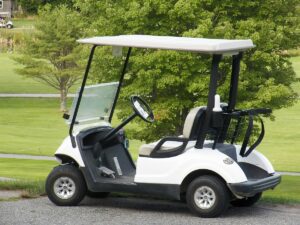Myrtle Beach Golf Cart Accident Lawyer
Golf carts are often presumed to be low-risk, especially by children under the age of sixteen. In fact, these low-speed vehicles (LSVs) have been involved in multiple types of collisions; with other carts, autos, pedestrians. There are frequent DUIs in golf carts, rollovers (usually from sharp turns) and even ejections from kids playing ‘bumper cars’ with them.
Our Myrtle Beach golf cart accident attorney knows all too well that permanent disabilities are frequent results of a golf cart casualty. Typical injuries beyond the usual cuts and abrasions are broken bones, traumatic brain injury (TMI), spinal cord impairment, paralysis, and unfortunately, even fatality.
The analysis of a 17-year study of non-fatal golf cart injuries treated in U.S. emergency rooms is outlined in this 2008 abstract published on the NCBI website. Data gathered in the study indicated injuries for 147,696 individuals, from age 2 months to 96 years — alarmingly, 31% of these were under the age of 16. The most common cause of injury (38%) was falling out of a golf cart. Each successive year there was a steady increase, with a 132% total increase over the 17 years.
Why Golf Cart Drivers are Getting ‘Off Track’
Unfortunately, golf cart labeling and marketing disparities can be confusing to the general public. This factor may have unwittingly contributed to indifference toward golf cart ‘rules-of-the-road,’ and a lack of respect and caution while behind the wheel.
Golf carts were labeled as golf ‘cars’ when they first rolled out in the 1930s — and are still regarded as such by the American National Standards Institute — because ‘carts’ are not self-propelled. The ANSI standard opened the market to customized golf ‘car’ products; many are labeled as golf cars and some even come with doors.
‘Street legal’ instructions are offered across the Internet, suggesting that by adding head and tail lights, turn signals, seat belts, rear and side-view mirrors, a speedometer, a horn, DOT approved tires, and a windshield wiper that you somehow have the same rights as an automobile. Not so.
Golf Cart Laws in Myrtle Beach SC
Regardless of equipment add-ons — or whether you use the word cart or car — these LSVs are simply not allowed to operate on public roads with speed limits over 35 mph. There is one exception to this law in 56-2-100B, which is when you are crossing the street at an intersection (where there would be signs and/or signals).
The South Carolina Code of Laws regulates the public operation and permitting of golf carts within this specialized segment of the Motor Vehicles code. You should be aware of the following statutes while operating a golf cart on Myrtle Beach streets or highways.
SECTION 56-2-100 Conditions for operation on a street or highway
- Do not travel on roads with speed limits over 35mph;
- You may only cross these streets at an intersection;
- In order to drive on streets and highways, you must meet the Federal Motor Vehicle Safety Standard 500, in that your golf cart must be equipped with the minimum equipment appropriate for motor vehicle safety.
- The local governing body may prohibit driving on any road as a safety precaution.
SECTION 56-2-105 Operation of a Golf Cart
- Only allowed to be driven during daylight hours
- A permitted cart may be operated within 4 miles from the ingress or egress points in gated communities; the 4-mile allowance outside the exit gate must be on a street with a posted speed limit of 35 mph or less
- In non-gated neighborhoods, golf carts may be driven on a street or secondary highway (posted 35 mph maximum) within 4 miles of the permit holder’s address.
- Golf cart drivers must have in their possession: a valid driver’s license, SCDMV registration certificate (permit), and proof of insurance.
- Your golf cart permit must be renewed every 5 years, or with any change of address.
In Myrtle Beach, you may obtain a golf cart permit for $5.00 at any South Carolina DMV branch; providing you are at least 16 years of age, have a drivers’ license, and liability insurance. Alternatively, you can download and mail in their registration form, accompanied by the same items.
Auger & Auger is Here to Help!
Auger & Auger Accident and Injury Lawyers is family-owned-and-operated, and we put our hearts and personal dedication into every case we pursue. When a serious injury, or death of a loved one, is the result of a Myrtle Beach golf cart accident — now is the right time to contact Auger & Auger at 843-385-9342 for a free consultation.















